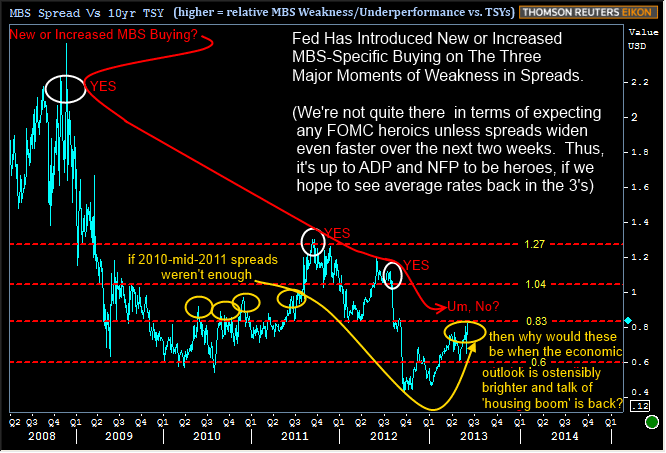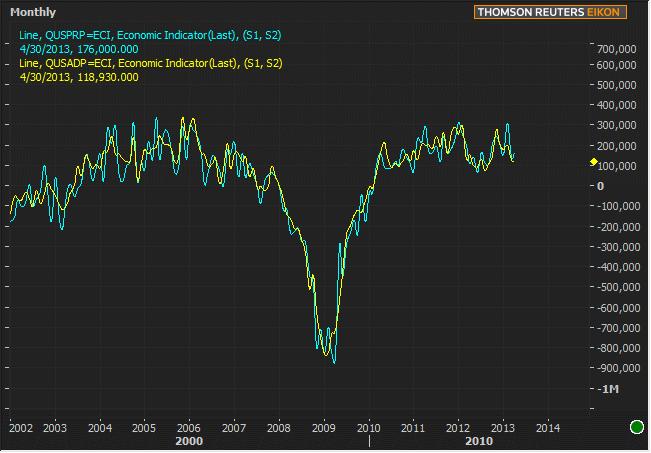It's a sign of the times when fringy (no negative connotation here; merely refers to edge of spectrum) non-voting FOMC members express their fringy opinions, and those fringy opinions happen to be a lot less fringy than they used to be. Take Dallas Fed Pres Fisher, for example, who was out overnight saying some things not entirely dissimilar with his previous sentiments regarding the efficacy of MBS purchases.
He also casually refers to the recent rising rate environment as an expected result of the prospects of tapering Fed asset purchases. Fisher doesn't disagree that the Fed should keep an eye out for any ill effects of rising rates, but neither should we live in fear that the market is upset that it's not getting more "monetary cocaine" (his words).
That notion is either incongruous with the reality of previous Fed policy changes or represents a change of heart. Then again, Fisher's fringe used to be mostly ignored by the central-to-dovish FOMC members, and now we have the Chairman himself saying the Fed wants to get back to a "predominantly Treasury Security portfolio." MBS have been bleeding on the sidewalk ever since. How could the centrists on the committee act so--well... fringy?
As is the frustratingly frequent case when it comes to explaining frustrating market events in 2013, 'this time is different.™' Actually, this time really might be different! There is that pesky matter of a hot-ish housing market in some sections of the country and that pesky problem of the Fed not really being in the business of crafting monetary policy to force the release of sufficient shadow inventory to cool any jets.
Even if the Fed, like many skeptics, doesn't quite agree with Fisher's assessment that we're in a "massive housing boom" (his words), the fact that it's even up for discussion, combined with recent all-time highs in equities, and topped off by fears about market disruptions come time for an actual exit from QE, is more than enough to start the 'taper talk,' if for no other reason than to desensitize markets for tapering's eventual debut.
'B-b-b-b-but.... MBS markets are bleeding on the sidewalk, remember? Won't that cripple the fledgling recovery? The Fed has ridden to the rescue of MBS before and they'll do it again by golly!'
This line of thinking is, in fact, quite logical; the questions, fair. But there's a huge immediate problem with it: the Fed doesn't have a history of that sort of critical thinking when it comes to MBS. Add the "boom" claims, ostensible market happiness, and exit disruption fears to the mix, and we can be relatively assured that we won't soon be hearing the thundering hooves of Bernanke's MBS stallion.
While that horse isn't out to pasture yet, it's been predictably stabled given the current state of affairs, and it helps make the point about the Fed's critical thinking. The following chart contains spreads of MBS YIELDS vs 10yr yields and the white circles show the instances where the Fed has announced NEW MBS buying (not the extension of pre-existing buying). The white circles might as well be Ben's white stallion, and as you can see, we're not quite into the previous danger zones that sent him running for the stable.

Bottom line, the Fed is, and will continue to be, 'OK' with the current pace of MBS widening and the current pace of the rising rate environment. In fact, they'd be delighted if the 400 point drop in Fannie 3.0 prices since May 3rd didn't have a significant impact on employment or prices. One thing's for sure though, until/unless it does, or until the underperformance of MBS gets much, MUCH worse than it has been in the past month (thinking about the little teal line at 0.83 getting up over 1.04 in the chart above), don't expect any heroics from the Fed. The current spread situation is like the proverbial 'stick' when it comes to motivating Bernanke MBS Stallion--a beast that has a 100% track record of preferring the 'carrot' offered by truly disconcerting spread blow-outs (see the white circles).
Where are our heroes then? What ends this recent misery?
Simply getting through NFP will be good for something. If we get through NFP Friday and are treated to a similar beat as the last report, it will have been good for marking the end of an era of prosperity in the frontier coupons of MBS history (here's lookin' at you, Fannie 3.0s... truly, you are a 'kid'--having only recently seen your third birthday). Such a beat is the one instance where MBS can actually keep widening at an even faster pace, as it would accelerate the expectation for near-term tapering.
The most timely hero today would be ADP employment. While the balance of the data this morning isn't to be dismissed (mostly due to ISM Non-Manufacturing at 10am), ADP employment has the wild card potential to throw NFP expectations on their ear. Of course, markets aren't stupid enough to think that ADP numbers guarantee anything at all when it comes to NFP, but they're smart enough to know that ADP vs NFP looks like this (chart below) over time, and is thus nothing to shake a stick at (or a carrot):

|
Week Of Mon, Jun 3 2013 - Fri, Jun 7 2013 |
|||||
|
Time |
Event |
Period |
Unit |
Forecast |
Prior |
|
Mon, Jun 3 |
|||||
|
08:58 |
Markit Manufacturing PMI |
May |
-- |
-- |
51.9 |
|
10:00 |
Construction spending |
Apr |
% |
1.0 |
-1.7 |
|
10:00 |
ISM Manufacturing |
May |
-- |
50.5 |
50.7 |
|
Tue, Jun 4 |
|||||
|
08:30 |
International Trade |
Apr |
bl |
-41.0 |
-38.8 |
|
Wed, Jun 5 |
|||||
|
07:00 |
MBA Mortgage market index |
w/e |
-- |
-- |
721.4 |
|
08:15 |
ADP National Employment |
May |
k |
160 |
119 |
|
08:30 |
Productivity Revised |
Q1 |
% |
0.7 |
0.7 |
|
08:30 |
Labor costs Revised |
Q1 |
% |
0.5 |
0.5 |
|
10:00 |
ISM N-Mfg PMI |
May |
-- |
53.3 |
53.1 |
|
10:00 |
ISM N-Mfg Bus Act |
May |
-- |
55.0 |
55.0 |
|
10:00 |
Factory orders mm |
Apr |
% |
1.5 |
-4.9 |
|
Thu, Jun 6 |
|||||
|
08:30 |
Initial Jobless Claims |
w/e |
k |
345 |
354 |
|
Fri, Jun 7 |
|||||
|
08:30 |
Non-Farm Payrolls |
May |
k |
160 |
165 |
|
08:30 |
Unemployment rate mm |
May |
% |
7.5 |
7.5 |
|
08:30 |
Average workweek hrs |
May |
hr |
34.5 |
34.4 |
|
08:30 |
Average earnings mm |
May |
% |
0.2 |
0.2 |
|
15:00 |
Consumer credit |
Apr |
bl |
12.50 |
7.97 |
|
* mm: monthly | yy: annual | qq: quarterly | "w/e" in "period" column indicates a weekly report * Q1: First Quarter | Adv: Advance Release | Pre: Preliminary Release | Fin: Final Release * (n)SA: (non) Seasonally Adjusted * PMI: "Purchasing Managers Index" |
|||||





